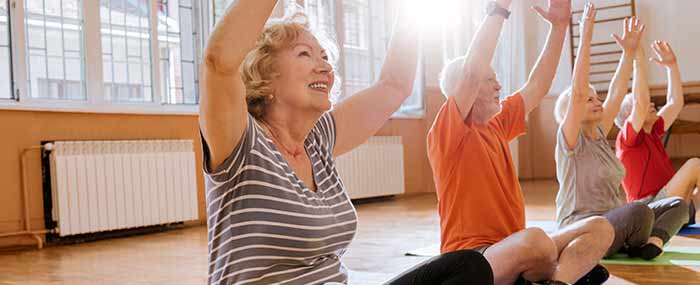Sometimes it seems like a lot changes as people age – we start experiencing different sleep patterns, or hormone fluctuations, and maybe even lowered immune function.
Plus, it can often feel like the brain just isn’t quite working the way it used to.
So what if there was something we could do to help jumpstart the brain and improve focus as we age?

Researchers at the University of Rochester, led by Jan A. Moynihan, PhD, looked at how mindfulness-based stress reduction (MBSR) might help people in their 60s and older change their brain, improve their ability to perform tasks, and increase immune function.
For the study, they randomly divided a group of about 200 people, all 63 years of age or older, into either a wait-list control group or an MBSR group, and measured their baselines.
The MBSR group received 6 sessions of sitting meditation, body scan meditation, mindful movement, and walking meditation adapted to accommodate age-related needs. The waitlist control received no instruction.
The researchers assessed the participants immediately after the program, and then again after 3 and 24 weeks.
So how did the MBSR participants fare compared to the control group?

Immediately after the program, participants scored higher on the Mindfulness Attention Awareness Scale, and also showed greater ability to perform challenging mental tasks. In both follow-ups, participants still showed these improvements.
To assess immune function, the researchers injected a harmless antigen (KLH) into the participants so that they could examine how the patient’s antibodies were working. While immune function did increase right after the program, improvement didn’t last for the follow-up examinations.
While results also showed brain change immediately after the program, there was no significant change later on. At their follow-ups, an EEG showed activation in the left frontal lobe associated with increased motivation and positive behaviors, but the participants were back to their baseline measurements within a few weeks.
But what does this all mean for the aging brain?

While it looks like mindfulness can help the brain work through problems and process information more quickly, the long-term possibilities need more investigation.
There are, of course, some things to keep in mind. Most importantly, the researchers didn’t look into whether or not the participants kept up with the MBSR practice after the program, so the long-term results might be skewed. And the wait-list control design doesn’t account for other factors that may have caused improvements.
To find out more, you can find the full study published online in the June 15th, 2013 edition of Neuropsychobiology.
There are so many ways that mindfulness can benefit our bodies and our minds. To learn more about how mindfulness can impact the brain, check out our courses on mindfulness.
How have you used mindfulness to improve brain function?
Please leave a comment below.
I had a stroke when I was in my early 20s and another when I was 37 and another during an operation when I was 40. I have extensive brain damage, yet at 67 I am healthy and active and working full time in a private practice. Throughout my life I have depended on God, faith, personal rehabilitation and natural medicine for help. Also a team of professionals when I was 40 told me I had a good healthy amount of determination! One of the foundation principles of my personal rehab when I was working to recover lost skills was to practice mindfulness. Mindfulness helped to retrain my brain to exhale when breathing, to finish words and sentences, to listen to music, to focus, etc. I use mindfulness as one of the tools to help all of my clients help themselves to gain skills in getting to know themselves and build coping skills. Mindfulness is something just about anyone can learn and it costs nothing and is available as a tool for everyone. That’s exciting!
Same as athletes maintain ther performance through constant training, and loose their stamina when not doing so, so mindulness has to be constantly practiced. This is also the case with Yoga, and Tai Chi Chuan, and Qi Gong.
Practice, Practice. Practice !
10/31/13:Please change me from Wed.( free listening)-After the seminar last night, I bought a Gold Membership. It was a fabulous presentation! Since I have done other Gold Memberships, I should have been aware that I would want to have all the materials…it was, as always, a delight to see Ram Das, my first teacher in the wayback days of the late 60’s. Be Here Now!
Thank you,
Ruth Martin MFT
I teach my clients to use both intentional eating of food they enjoy, and eating it slowly and mindfully. It has a double effect: stress relief, and eating just enough: not too much, or too little. So many women are afraid of gaining weight that they end up chronically under-eating and thus slowly down their metabolism.
Women develop a new understanding of their body’s needs, nurture themselves and have an opportunity at least one time a day to do this practice. It works!
I have been using mindfulness with my special education student since 1979. As my audience has shifted it remains the central anchor to every other part of life. Whether my clients are a couple trying to figure out a way into intimacy and out of combat; or teens feeling less than with compromised self-esteems and those who have been suicide experimenters-helping put basics back into life is mindfulness. It is becoming the expert on you.
Now I feel stidup. That’s cleared it up for me
I am new to Mindfulness and have not used any of the techniques or activities to see how they would affect me. However, I am looking forward to starting some meditation. I have one of Joan Borysenko, Ph.D meditation CD and am going to start listening to it as part of my lunch break. I am 71 years old and have noticed that my ability to pull data from my brain is not what it used to be. The research is enough to get a person interested. I am assuming if a person kept up with the activities of MBSR they would show continual improvement of brain function.
I was hoping that the mindfulness group were encouraged to continue, then we can see if there was at least an accumulative effect. My own health has improved using the mental patterns taught by Access Bars. Now I can heal my injures such as bad falls which may have sprained or broken a finger and injured my knees (I did not get x-rays) with less time and effort than I recall when younger. As we age being mindful is going to be essential as we pick up our feet instead of shuffling or watch how we move our body. Perhaps we needed to study our body by mindful moves when we were younger thus we’d have less accidents earlier. Currently we live very distracting lives using TV as we drive or cellphones as we walk or cycle, but we might not be actually as efficient as if we stopped and did only one at a time. Those tests on speed and accuracy while doing too much at one time are interesting for aging brains.
Thought provoking article! Thank you for sharing!